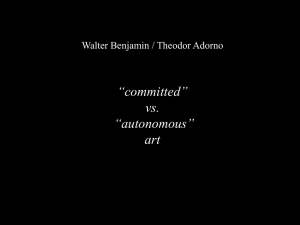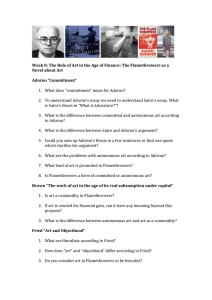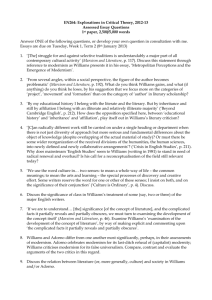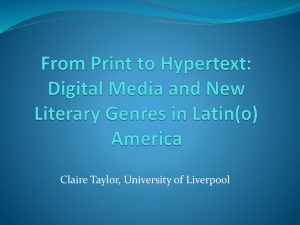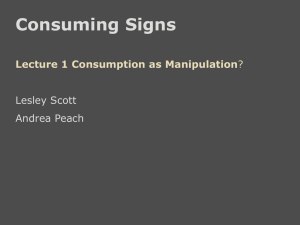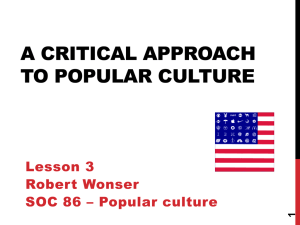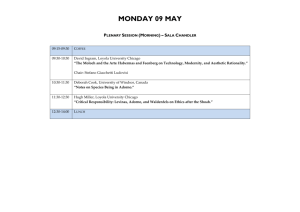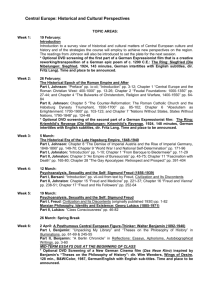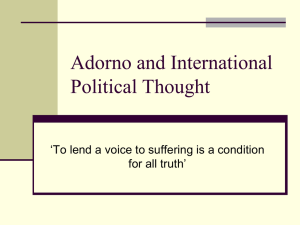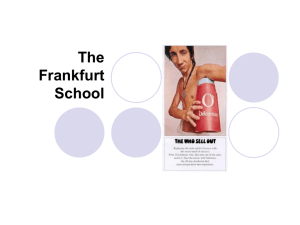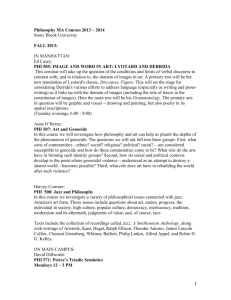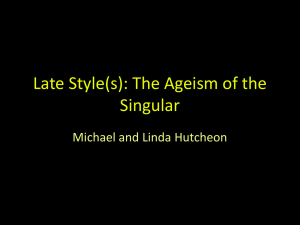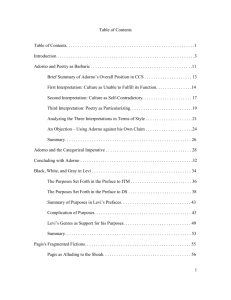- Society for Research into Higher Education
advertisement
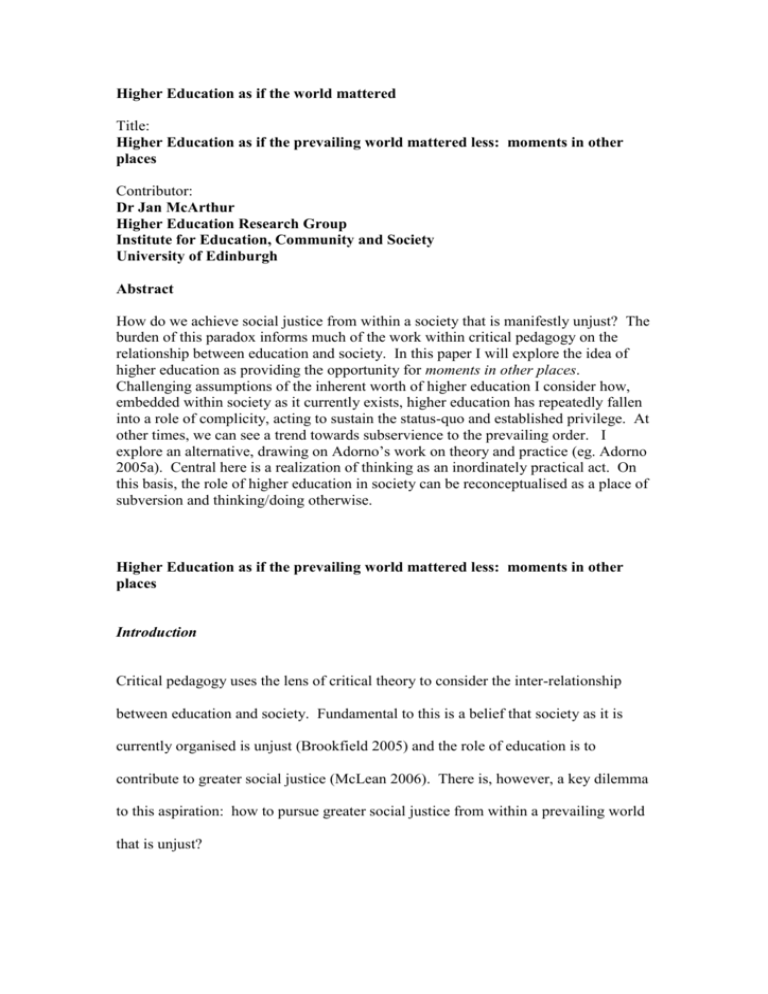
Higher Education as if the world mattered Title: Higher Education as if the prevailing world mattered less: moments in other places Contributor: Dr Jan McArthur Higher Education Research Group Institute for Education, Community and Society University of Edinburgh Abstract How do we achieve social justice from within a society that is manifestly unjust? The burden of this paradox informs much of the work within critical pedagogy on the relationship between education and society. In this paper I will explore the idea of higher education as providing the opportunity for moments in other places. Challenging assumptions of the inherent worth of higher education I consider how, embedded within society as it currently exists, higher education has repeatedly fallen into a role of complicity, acting to sustain the status-quo and established privilege. At other times, we can see a trend towards subservience to the prevailing order. I explore an alternative, drawing on Adorno’s work on theory and practice (eg. Adorno 2005a). Central here is a realization of thinking as an inordinately practical act. On this basis, the role of higher education in society can be reconceptualised as a place of subversion and thinking/doing otherwise. Higher Education as if the prevailing world mattered less: moments in other places Introduction Critical pedagogy uses the lens of critical theory to consider the inter-relationship between education and society. Fundamental to this is a belief that society as it is currently organised is unjust (Brookfield 2005) and the role of education is to contribute to greater social justice (McLean 2006). There is, however, a key dilemma to this aspiration: how to pursue greater social justice from within a prevailing world that is unjust? Complicity and Subservience: a short history of higher education and society From their very inception universities have been institutions where privilege has been promoted and protected (Kivinen & Poikus, 2006, p. 189). Over time the locus of power may have changed, moving between Church, State and global capitalism, but as Rowland (2003) has observed, through all these changes the relationship between the university and the prevailing social system has endured. Even von Humbolt’s university, while arguing for freedom from external interference, existed to support the prevailing civil order, with its attendant privileges. During the recent decades of unprecedented expansion, universities have managed to retain this elitist model of what should constitute a higher education and retain the social class distinctions governing educational opportunities (Coffield & Williamson, 1997). Over recent years the price to pay for such complicity has become clearer. On a governmental level this has been enacted by the progressive marginalisation of higher education as a central policy concern – while simultaneously higher education has come more and more under external control. An example of the marginalisation is the reorganisation of government departments, in which higher education as an important area in itself has slowly disappeared (McArthur 2011). The increase in external control is not one of direct government, but a more insidious change in the financial perspectives of universities (eg through increases in tuition fees and funding mechanisms such as the REF). This is then reinforced by a confusion of purpose that makes it harder for universities to know on what basis they should justify their own existence. How do we find justice in an unjust world? The importance of stepping outside the mainstream is a recurrent theme in the critical theory of the Frankfurt School. The assumptions, habits and pathologies of the world as it currently exists form powerful barriers to greater social justice, more so because of their often implicit, inert or invisible nature. This is the extraordinary power of the simply taken-for-granted. Richter (2007), in his examination of the Frankfurt School, invokes the notion of ‘paleonomy’ to understand a thought or action that is both within a certain tradition and standing outside it: one that is ‘perpetuating the tradition while breaking with it, and breaking with the tradition while perpetuating it’ (p. 1). I suggest that higher education offers a particular place in which we can both stand within a tradition (of knowledge, thought, action) and also genuinely challenge it. I argue that higher education can and should be a very special place for thinking (McArthur 2013). However, this is decidedly not an argument for the so-called ivory tower. The ivory tower suggests thought that is unrelated to the world as it exists, and as such it is anathema to the principles of Adorno’s critical theory. My argument is built upon Adorno’s position that ‘thinking itself is always a form of behaviour’ (Adorno 2008 p.53) and to think about reality is itself a practical act. Further, ‘thinking is a doing, theory a form of praxis’ (Adorno 2005a p. 261). Facing the realities of an unjust world is a hard task, one that few of us are able to sustain with relentless consistency. Just day to day functioning in a world filled, as it is, with horrors, tragedies and cruelties is difficult without retreating from time to time into what Adorno described as “bourgeois coldness” (Adorno 2005a p. 274). The role of higher education, then, is to provide the places in which one can shrug off this coldness and think otherwise about what currently exists. Hence while higher education needs to be truly embedded in the social world as it exists, it must also be somewhere other in order to fulfil its social justice potential. Here the ‘uneasy thought’ (Goehr 2005) of Adorno can guide our sense of purpose. So while it is welcoming to look at those examples within higher education that have contributed to greater social justice, our key goal must always be to look for the unsatisfactory, the failures and the lurking oppressions. As Adorno (2005b) observed: The splinter in your eye is the best magnifying glass (p. 50). Barriers to moments in other places There are three very powerful barriers to moving beyond the world as it currently exists: these are aspects of higher education that root it within the prevailing world and thus which can potentially dull our social justice aspirations. The first is an area not yet sufficiently tackled by critical pedagogy in the context of the UK: assessment. There are fierce structural barriers to thinking outside what currently exists within the assessment framework of predetermined learning outcomes and inflexible “quality” processes. The vast majority of assessment tasks used today revolved around knowing that which has already been known – and pretty much in the form in which it has already been known. Indeed, as Brina (2003) observes: ‘academia has its own norms and values that can interfere with critical and emotional engagement’ (p. 523). Arguably doctoral work is an exception here, but again, norms and conventions can have a powerfully sterilising effect on what many doctoral students do in the name of “original contribution”. The second barrier is the role higher education plays in educating people for various professional roles. Here, the work of higher education is mediated with the expectations, values and priorities of the professional bodies. Hence, there is an enormous sector of higher education that is formally entrenched in supporting the prevailing mainstream. While it is true that some of these professional bodies embrace a critical disposition as one of the attributes they want their graduates to have, genuinely nurturing this within an established set of rules is extremely difficult. A third barrier lies in higher education’s embrace of student centredness, the student perspective, student welfare and student “voice” over recent years. How do we reconcile these with notions of uneasy thought: with encouraging students to have splinters in their eyes? Conclusion: Looking forward to higher education and a different world This paper does not offer a particularly optimistic insight into higher education and social justice, and this reflects the theoretical frameworks that inform my analysis. My task is incomplete, and to date has been more to establish the importance and potential for higher education outside the prevailing order, rather than to prescribe what this would be like. However, in the spirit of Adorno’s work on theory and practice, this act of thinking is itself the creation of a different place to be. I hope in so doing to highlight the very special role that conceptual research has to play in higher education’s contribution towards greater social justice. For unlike empirical research (which is also highly valuable) conceptual research can work outside that which currently exists. As such, the conceptual is also highly practical. It is, in Greene’s (1995) terms, the imagining otherwise through which social change occurs. References ADORNO T.W. 2005a. Critical Models. New York NY: Columbia University Press. ADORNO T.W. 2005b. Minima Moralia. London: Verso. ADORNO T.W. 2008. Lectures on Negative Dialectics. Cambridge: Polity. BRINA C. 2003. Not crying, but laughing: the ethics of horrifying students. Teaching in Higher Education 8: 517-528. BROOKFIELD S. 2005. The Power of Critical Theory for Adult Learning and Teaching. Maidenhead: Open University Press. GOEHR L. 2005. Reviewing Adorno: Public Opinion and Critique - Introduction to Adorno's Critical Models. New York NY: Columbia University Press. GREENE M. 1995. Releasing the Imagination: essay on education, the arts, and social change. San Francisco: Jossey-Bass. MCARTHUR J. 2011. Reconsidering the social and economic purposes of higher education. Higher Education Research & Development 30: 737-749. MCARTHUR J. 2013. Rethinking Knowledge in Higher Education: Adorno and Social Justice. London: Bloomsbury. MCLEAN M. 2006. Pedagogy and the University. London and New York NY: Continuum. RICHTER G. 2007. Thought Images: Frankfurt School Writers' Reflections from Damaged Life. Stanford CA: Stanford University Press. ROWLAND S. 2003. Learning to comply; learning to contest, in J. Satterthwaite, Atkinson E. & Gale K. (ed.) Discourses, Power and Resistance: 13-25. Stokeon-Trent: Trentham Books.
